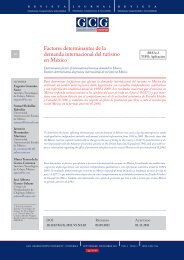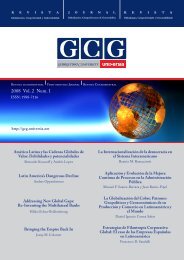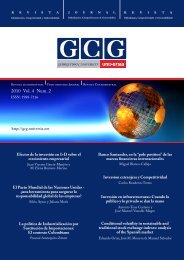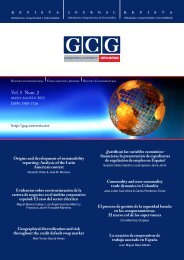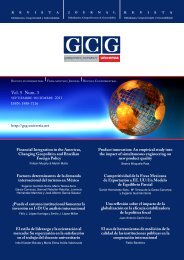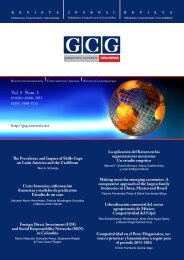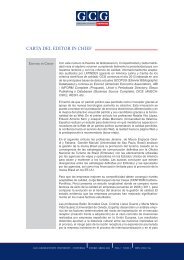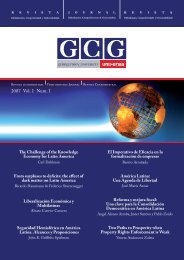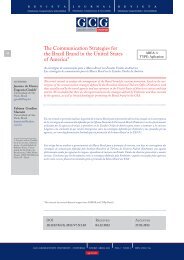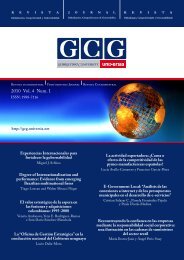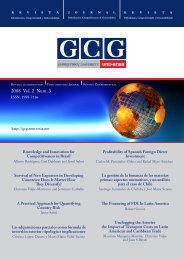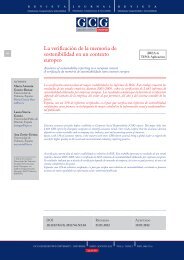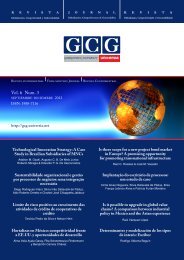Vol. 6 Num. 1 - GCG: Revista de Globalización, Competitividad y ...
Vol. 6 Num. 1 - GCG: Revista de Globalización, Competitividad y ...
Vol. 6 Num. 1 - GCG: Revista de Globalización, Competitividad y ...
Create successful ePaper yourself
Turn your PDF publications into a flip-book with our unique Google optimized e-Paper software.
241. IntroductionI study the <strong>de</strong>terminants of the success of international joint ventures (IJVs) among <strong>de</strong>velopingcountry multinational companies (DMNCs). Although there is a large literatureanalyzing IJVs (see reviews in Inkpen and Beamish, 1997; Parkhe, 1993; Reus and Rottig,2009; Salk and Lyles, 2007), most of it has focused on studying IJVs with one partnercoming from an advanced economy, the local partner being in a <strong>de</strong>veloping country, andboth operating in the same industry. In this type of alliances, the implicit assumption isthat the local partner provi<strong>de</strong>s the knowledge on how to navigate the challenging <strong>de</strong>velopingcountry conditions and gains expertise in technology, while the foreign partnerprovi<strong>de</strong>s the technological expertise and gains knowledge on how to operate in the <strong>de</strong>velopingcountry. This specialization in roles of partners operating in the same industryand the potential of strengthening a competitor, be it the foreign firm gaining a footholdin the <strong>de</strong>veloping country or the local firm upgrading its technology, has led researchersto caution about IJVs and the transfer of capabilities to competitors.However, in contrast to these studies I focus on analyzing IJVs among <strong>de</strong>veloping countryfirms. These challenge the implicit assumption of the specialization of partners sinceneither partner may be at the technological frontier or lack knowledge on how to operatein <strong>de</strong>veloping countries. To gain a better un<strong>de</strong>rstanding I study the case of the IJV betweenthe Mexican conglomerate Salinas and the Chinese automaker FAW for the creationof a car assembly operation in Mexico in 2007. Although the IJV collapsed by 2009, itreveals several interesting i<strong>de</strong>as regarding the success of IJVs in general and IJVs among<strong>de</strong>veloping countries in particular. First, the case reveals a different logic of specializationsince the two companies were operating in different industries and thus the fear of creatinga competitor was not present. Instead, the two companies were truly specialized,one in the industry and technology and the other in the market access and navigation ofinstitutional conditions. Thus, this created the opportunity for a <strong>de</strong>ep collaboration andreduced the fear of helping a competitor. Second, external events led to the failure of theIJV as the partners could not solve the challenge of being <strong>de</strong>veloping country multinationals;the recession of 2008 and the perceived lower quality of cars created by <strong>de</strong>velopingcountry firms limited their ability to sell.The paper thus contributes to the literature by providing a better un<strong>de</strong>rstanding of someof the unique challenges that IJVs among <strong>de</strong>veloping country firms face that were littlediscussed in the literature before. In so doing, it i<strong>de</strong>ntifies one implicit theoretical assumptionof IJV studies: the tension between collaborating for mutual gain and the competitionamong firms operating in the same industry.The paper is also useful for managers of <strong>de</strong>veloping country firms. It helps them betterun<strong>de</strong>rstand the benefits and challenges of establishing IJVs with other <strong>de</strong>veloping countryfirms. It encourages the specialization of the firms into market or technology to avoidthe challenges of helping a competitor, but at the same time cautions about the challengesof un<strong>de</strong>rtaking IJVs with other <strong>de</strong>veloping country firms since these IJVs, althoughstrategic and potentially profitable, suffer from the perception of lower quality of productsgenerated by <strong>de</strong>veloping country firms.Key wordsAlliances,International jointventures,Developingcountrymultinationals,Emerging markets,China, Mexico,FailurePalabras claveAlianzas,joint venturesinternacionales,multinacionales<strong>de</strong> países en vías<strong>de</strong> <strong>de</strong>sarrollo,mercadosemergentes, China,Méjico, fracasoPalavras-chaveAlianças,Joint venturesinternacionais,Multinacionais<strong>de</strong> países em<strong>de</strong>senvolvimento,Mercadosemergentes, China,México, FalhaJEL Co<strong>de</strong>sM16; F23<strong>GCG</strong> GEORGETOWN UNIVERSITY - UNIVERSIA ENERO-ABRIL 2012 VOL. 6 NUM. 1 ISSN: 1988-7116pp: 23-35



